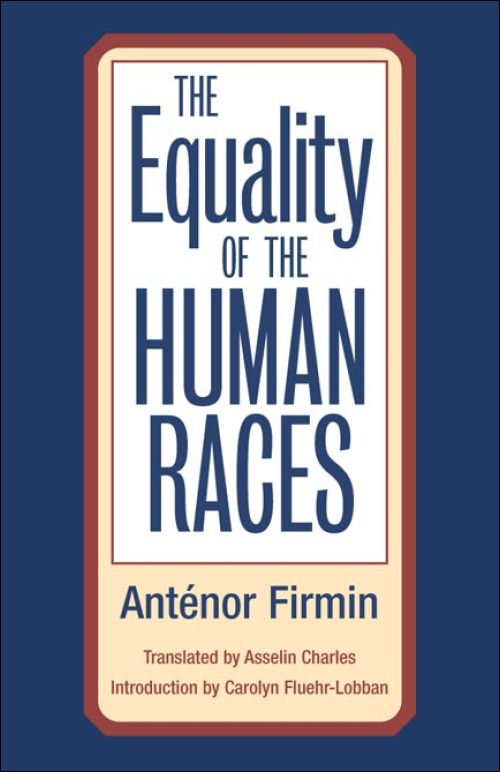Deconstructing Pseudo-Scientific Anthropology: Anténor Firmin and the Reconceptualization of African HumanityPosted in Anthropology, Articles, History, Media Archive on 2015-03-23 01:41Z by Steven |
The Journal of Pan African Studies
Volume 7, Number 2, August 2014
pages 9-33
Gershom Williams, Adjunct Professor of African-American History and African-American Studies
Mesa Community College, Mesa, Arizona
“The science of inequality is emphatically a science of White people. It is they who have invented it, and set it going, who have maintained, cherished and propagated it, thanks to their observations and their deductions.” –Jean Finot, Race Prejudice (1907)
“A preponderance of (fossil) and genetic evidence has revealed, virtually beyond a doubt, that the same Europeans who created the idea of race and White supremacy are the genetic progeny of the very Africans they devalued.” –Salim Muwakkil, Chicago Tribune
Abstract
Euro-American ideas and assumptions regarding African innate inferiority and racial inequality are central to the pseudo-scientific ‘race myth’ of White supremacy. In their search to find an expedient explanation, rationalization and justification for the horrific holocaust of enslavement, Europeans and later White Americans developed the international thesis and concept of African biological and intellectual inferiority.
In this exploratory essay, I am endeavoring to present a critical review of the anti-racist, vindicationist tradition of African American and Haitian intellectuals who challenged, rejected and refuted the ‘scientific racism’ of Euro-American ethnologists, Egyptologists, anthropologists, historians, philosophers, and physicians.
In another essay that we discuss in the contents of this manuscript, anti-racist theorists Stepan and Gilman argue that those stigmatized and stereotyped by the ideology of ‘scientific racism’ published prolific counter narratives that remain obscured and unrecognized by the historians of mainstream science.
What did the men and women of African descent in the diaspora, categorized by the biological, medical and anthropological sciences as racially inferior have to say about the matter? How did they respond to the charges and claims made about them in the name of science? In seeking to provide credible answers to the latter questions, we are re-visiting the powerful and illuminating publications by Black American and Haitian writers of the pre-Antènor Firmin era which are viable proof of the vindicationist tradition inherent among diasporan Black intellectuals. This school or community of literate intellectuals boldly offers a passionate and consistent rhetoric of resistance to economic and psychological enslavement and the mis-education of their people.
This essay remembers and pays homage to those public intellectuals of the early and late nineteenth century who dared to disagree with popular opinion and proceeded to debate the dangerous discourse of race and the fallacy of White supremacy. Central to our narrative are the names and voices of David Walker, Lydia Maria Child, Frederick Douglass, Martin R. Delaney and George Washington Williams. All of the aforementioned writers preceded the publication of Haitian scholar and statesmen Joseph Antènor Firmin’s The Equality of the Human Races in 1885. Haitian anthropologist, Egyptologist, Pan-Africanist and politician J. Antènor Firmin did not rise out of an intellectual vacuum to conduct study and research for his massive and masterful manuscript.
As I attempt to demonstrate in this paper, there is a long standing pre and post Firmin intellectual tradition in the United States and Haiti during the early nineteenth and continuing throughout the twentieth century. Like many of the intellectuals already mentioned, Antènor Firmin (a descendant of the Haitian intellectual Maroons) obviously did not possess an inferiority complex. He was not intellectually intimidated by the dominant thinking and behavior of the advocates of racial ranking and hierarchy.
A bold and brilliant thinker, he re-envisioned and re-conceptualized the image and pre-colonial cultural heritage of African descended people. Lastly, my essential purpose in presenting this paper is to convey to the reader(s) that prior to the invention and propagation of the ‘race myth’, the concept and belief in Black inferiority was non-existent.
As classicist historian Frank M. Snowden Jr. writes in his iconic text, Before Color Prejudice: The Ancient View of Blacks, “…Nothing comparable to the virulent color prejudice of modern times existed in the ancient world. This is the view of most scholars who have examined the evidence and who have come to conclusions such as these: The ancients did not fall into the error of biological racism; Black skin color was not a sign of inferiority…” (Snowden 1983: 63) By confronting and deconstructing the multitude of racial myths and stereotypes fashioned by Euro-Americans centuries ago, Antènor Firmin and others who believed in liberty, equality and fraternity could dismantle and destroy the foundational pillars of scientific racism. It is indeed instructive to remember what anthropologist Melville J. Herskovits stated a half century ago. “…The myth of the Negro (African) past is one of the principal supports of race prejudice in this
country…”
Read the entire article here.
